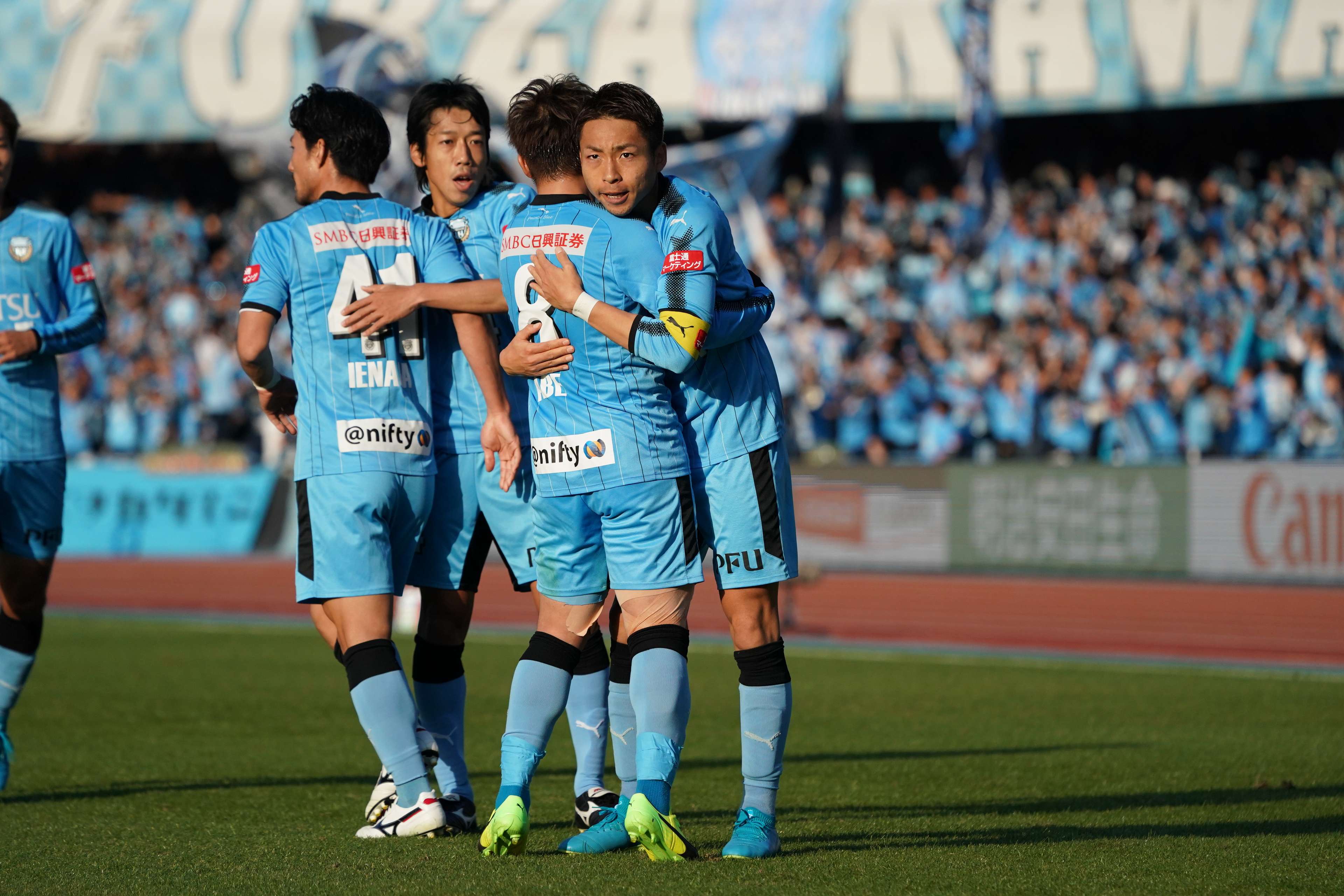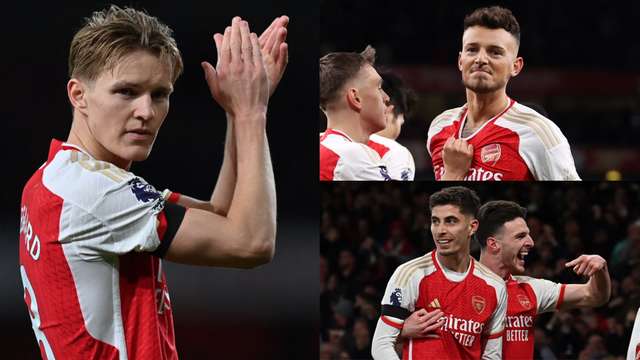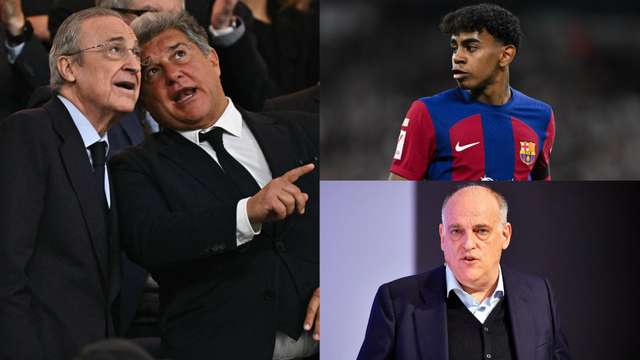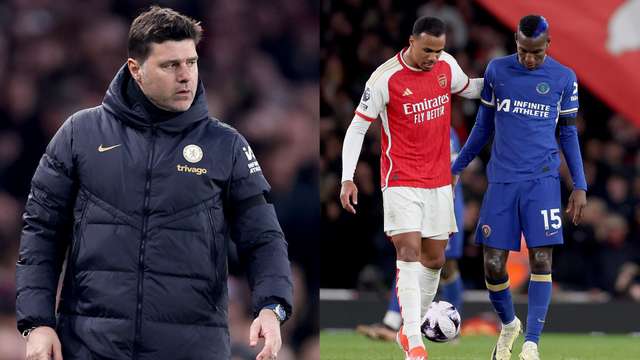On December 2, 2017, in the last game of the J1 season, Kawasaki Frontale faced Omiya Ardijya at their home stadium Todoroki Athletics Stadium. After Kawasaki scored a goal in the first 45 seconds of the game, they continued to fully demonstrate their offensive style and then their ace Yu Kobayashi scored a hattrick.
In extra time, Kawasaki scored their 5th goal and as the whistle blew for the end of the game, players received the information that Kashima Antlers who led by 2 points in the standings were held to a draw in their fixture.
That helped Kawasaki surpass Kashima on goal difference and capture its first-ever J1 league title in the team's history. Manager Oniki Toru, a former player and coach of the team, expressed his emotion in the post-game press conference after his 1st season as manager.
“Finally the needle on the history of Kawasaki Frontale`s clock has started ticking.”
Next Match
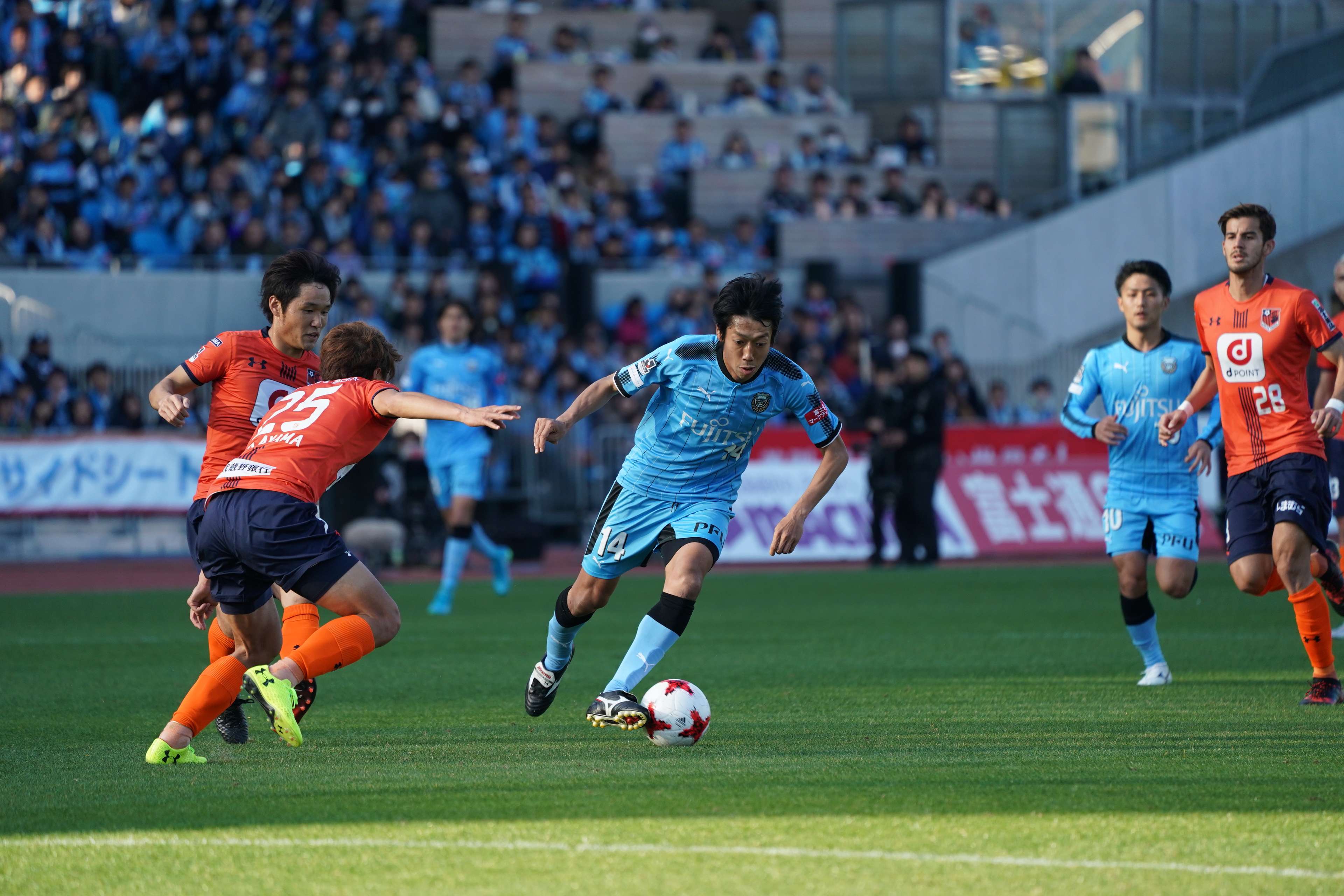
As Kawasaki finally captured its long-awaited first title in their 21st season of the club, looking back on their journey, there were numerous bumps in the road to get to where they are today.
Kawasaki was established in 1996 to join the J. League and in the following year, the team changed its name to “Kawasaki Frontale.” They were able to receive approval for “J. League Associate Membership,” which is needed to be promoted to J. League. However, they finished 3rd in JFL, the league which they were part of at that time. They did not meet the quota of finishing within the 2nd place, and they needed to wait another year to be promoted to J. League.
They ended the JFL season in 2nd place the following year. However as J. League was changing to a two-stage format from the upcoming season, they needed to enter the promotional playoff game”. This game is known to the fans as “Tragedy of the forest of Hakata.”
Kawasaki travelled to Hakata’s Mori Stadium (currently Level Five Stadium) to face the last placed J. League team in Avispa Fukuoka. For this do or die game, both teams were evenly matched in the first half that finished 1-1, but Kawasaki struck first in the second half to take the lead, 2-1. Kawasaki allowed a goal from their own mistake right at the end and the game entered into extra time. They allowed a go-ahead goal for Fukuoka and suffered a 2-3 defeat. Again Kawasaki lost out on promotion to J. League.
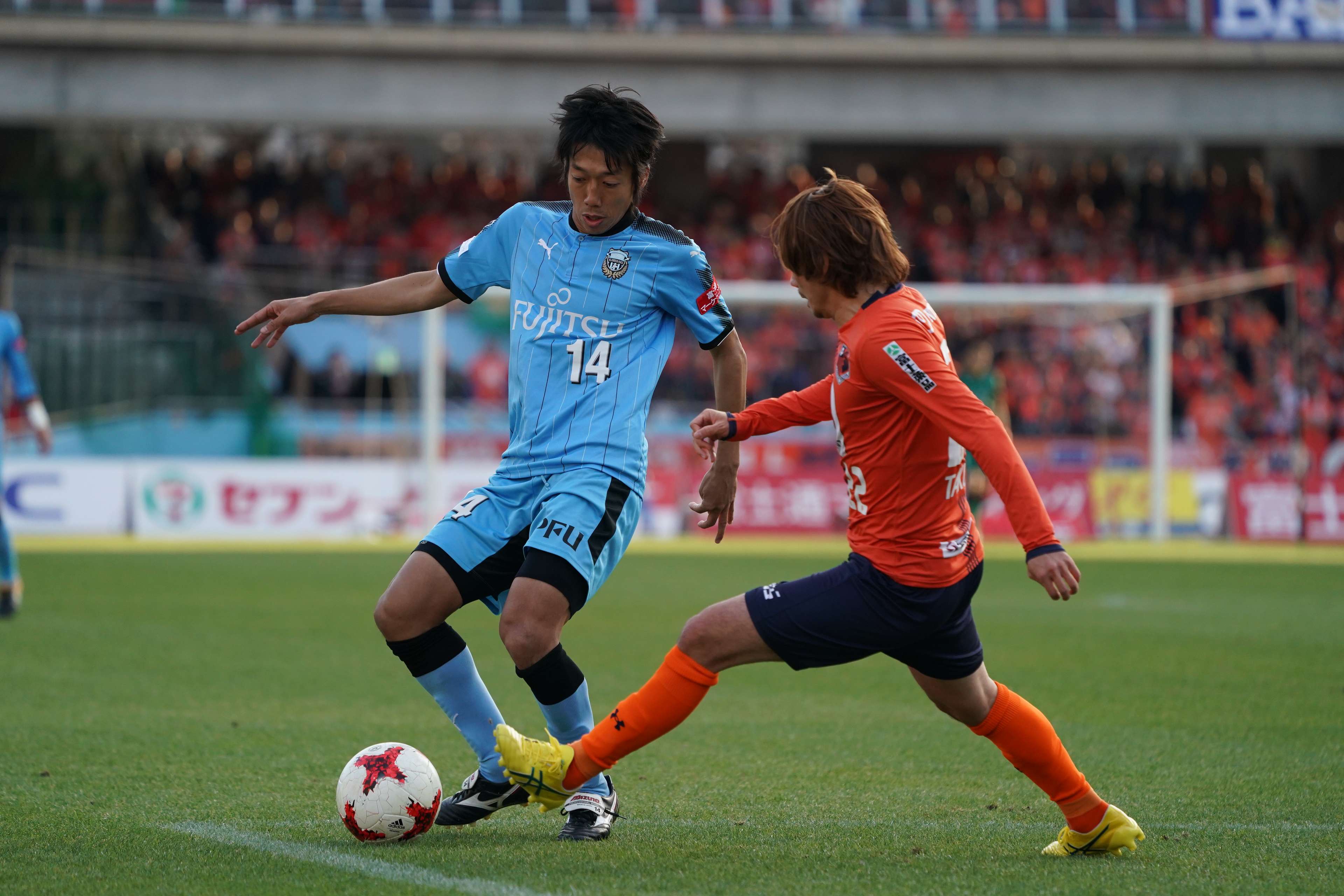
In Japan, there is a saying, “Third time lucky", and it was the third time in 1999 when Kawasaki was finally able to capture its path to J1. As J. League developed into two-tier leagues, they were able to win the first year of the J2 season. However in their first season competing in J1 in 2000, they suffered four straight losses on two occasions and wins were at a premium. That resulted in two separate changes in manager during the season. That showed in the annual standings as Kawasaki finished in the last place which slipped them back to J2. On the other hand, they moved on to the championship game in Nabisco Cup (currently J. League YBC Levain Cup), but lost to Kashima 0-2 and were not able to capture their first title.
Kawasaki needed to restart from J2 again, but finished 7th in 2001 and 4th in 2002. In 2003 they were able to finish 3rd, but again was one step short of earning the promotion to J1. They finally accomplished the goal in 2004. With new manager Takashi Sekizuka, they were able to put on an unexpected run with an offensive style. With the addition of playmaker Kengo Nakamura who kept controlling the games, Juninho was able to get plenty of goals. Juninho, nicknamed Sun of Kawasaki, scored 37 goals in the 2004 season in J2 and finished as the top scorer. The team as a whole scored 104 goals in 44 games and showed overwhelming aggression to win the J2 season. For the first time in 5 years, they earned the return to the J1 stage.4
Nakamura who continues to be a central figure of the club, talked about the past, “When I joined Frontale, there were not many supporters and the empty 2nd-floor seats were hidden by the giant flag. The supporters base grew with the team’s results and the club’s dedication toward the community.”
The stadium was filled with excitement in their home games for the 2017 season when they won their first title. The average attendance per game for Kawasaki’s 2017 season home league games were 20,250. In the year they were relegated to J2 in 2001, the average attendance per game was 3,784 people, and there were steady efforts from the club in order to create the popular state they’re in now.
Players and staffs went to the local shopping area day and night to increase the club’s recognition. Many ideas were brought to life at the stadium bringing an entertainment quality along with the “Omotenashi (serving)” mentality of the Japanese culture. With the efforts, Kawasaki became a club loved by the community and people and along with their record, the number of attendance increased. On a side note, even as the club became well-known within Kawasaki, the new players continue to go around the local shopping area as part of their rookie training. They need to continue to value the community and tradition.
After returning to J1, in 2005 they finished 8th and ended up in 2nd for the 2006 season which resulted in their first challenge in the AFC Champions League for the 2007 season. Unfortunately, the history of finishing one step short of the title has continued.
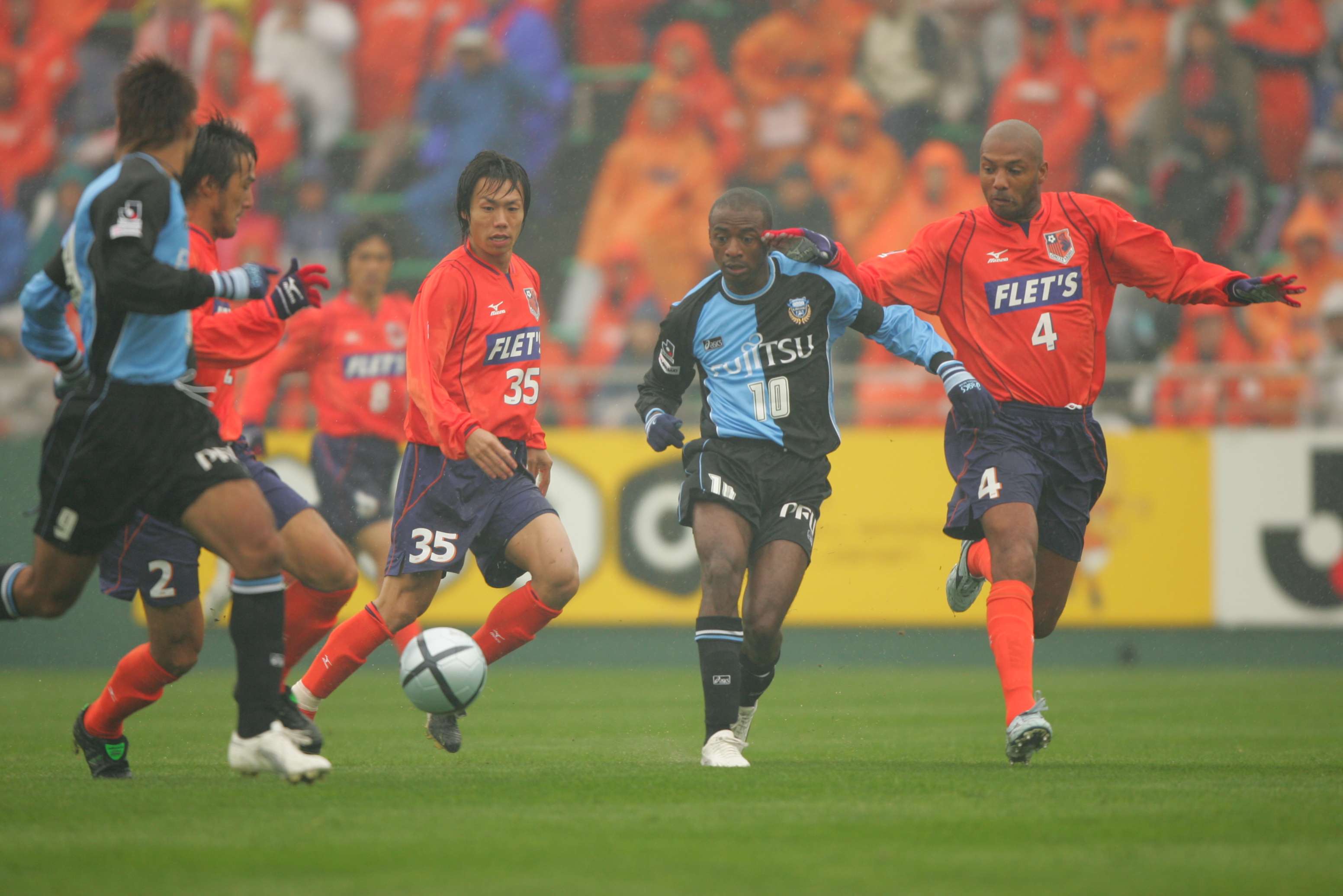
In 2007, they have moved on to their 2nd Championships appearance for the Nabisco Cup but lost to Gamba Osaka, 0-1. They also advanced to the championship game for Nabisco Cup in 2009, but lost to FC Tokyo, 0-2 and were not able to raise the trophy. In that same year of 2009, the defence became stable with the presence of two-time World cup member GK Eiji Kawashima and the offensive pair of Nakamura and Juninho scored goals aplenty. With an opportunity to capture the J1 title in the last week, Kawasaki ended up with a victory over Kashiwa Reysol, but 1st placed Kashima also won, which resulted in a 2nd place finish. Nakamura said with bitterness, “Even till now, I cannot forget the win that nobody was happy about.”
In the midst of the 2012 season, Kawasaki brought in manager Yahiro Kazama in order to develop their strength in the offensive style play. As they developed a style to increase the ball possession in order to take control of the game, the offensive strength became an even better weapon. Nakamura became the conductor of the offence with his varied passes. As Yoshito Okubo joined in 2013 and led the team, ending as the goal leader for three straight years. In their 20th season of existence, in 2016 the opportunity for a title in manager Kazama’s 5th year became high.
However, the goddess of victory was tough on Kawasaki yet again. After finishing 2nd, they lost to Kashima in the semi-finals of the J. League championship. Another loss to Kashima followed in the Emperor’s Cup after losing out 1-2 in extra time.
Manager Oniki was promoted to coach in 2017 and implemented a speedy style of transition and hard work not only on offence but also developed the defensive side of the game. Along with an already established passing game which other teams recognized, they became a squad that competed. However, in the Levain Cup Finals that was played on November 4th, the team ended up with defeated tears in their eyes. “We even felt like we were cursed.”
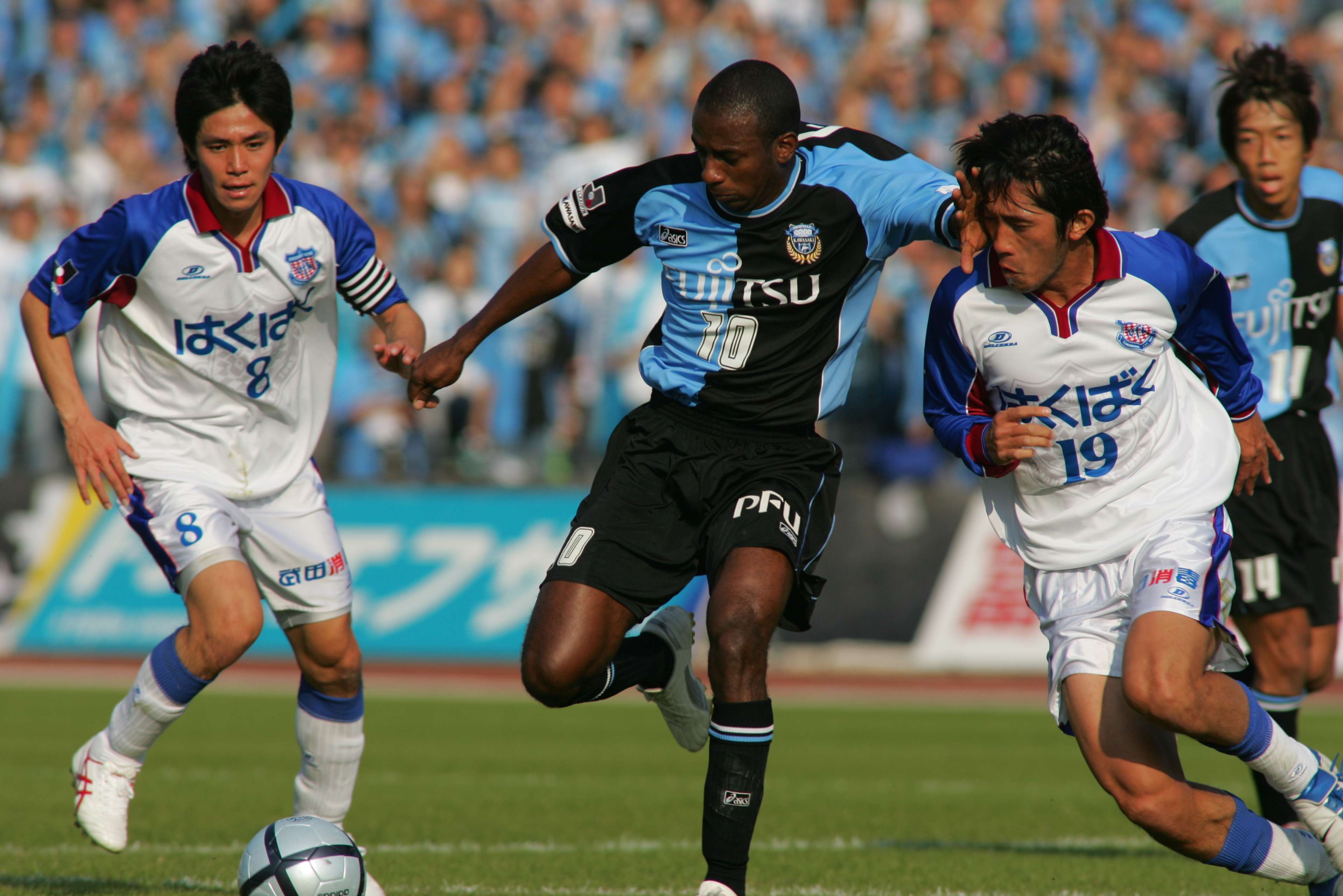
That quote is by Yu Kobayashi, who ended 2017 as the top scorer with 23 goals and earned the best player of the year award.
After a dissapointing Levain Cup final, 2nd place Kawasaki and 1st place Kashima was 4 points away with three games left in the J1 season. However, manager Oniki was not about to give up. Kashima was unable to finish strong in the last three games. On the other hand, Kawasaki finished with three straight wins. As they pressured Kashima finishing with a tie in annual points, they won by goal differences and earned their first-ever J1 title. Nakamura quotes, “It was a great feeling to win the championship over Kashima.”
The joy of overcoming Kashima was probably exceptional as they were a team that took the championship from them a number of times. It was the 19th year for manager Oniki as a member of Kawasaki going back to his playing days in 1998. It was the 15th year for Kengo Nakamura who has been part of Kawasaki throughout his playing career. There is significance in the first ever title with the two overcoming all the club’s adversity and being united as player and manager. With that being said, the opening quote from manager Oniki increases its weight.“ After earning the first title, Kawasaki’s needle on the clock has finally started to tick in a big way.
